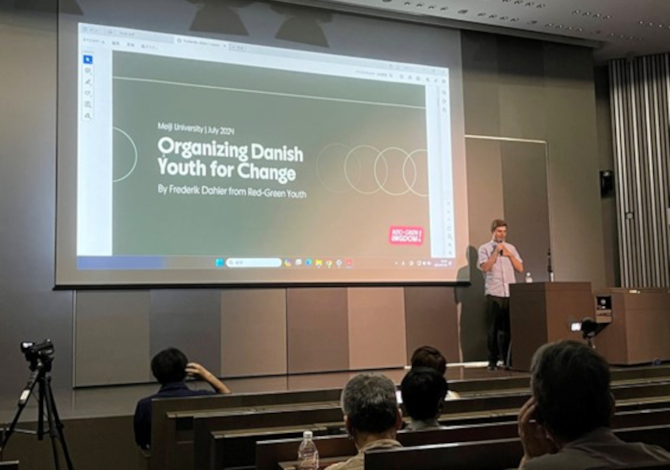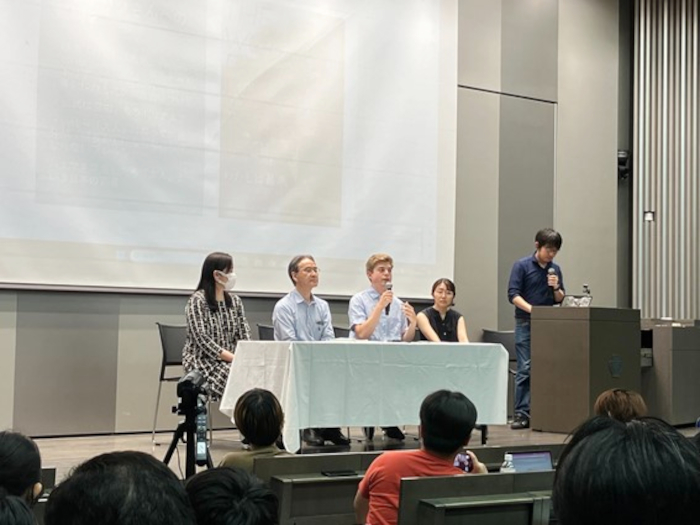[School of Political Science and Economics] “Denmark’s Innovative Society: Talks by youth organizations’ leaders and researchers” was held (co-organized by the KURACHI Seminar)
Sep. 05, 2024

Mr. Frederik Dahler, giving a keynote speech
On July 18, the KURACHI Shintaro Seminar of the School of Political Science and Economics co-organized an open seminar, “Denmark’s Innovative Society: Talks by youth organizations’ leaders and researchers,” with NO YOUTH NO JAPAN at the Global Front on the Surugadai Campus. Leaders of youth organizations and researchers whose research themes are focused on Scandinavia or Denmark held discussions to gain insight into the state of the current Danish society that has made progressive and innovative efforts in the areas of green economy, social security, and gender issues.
After the opening address by Associate Professor KURACHI, Ms. NOJO Momoko, the representative of NO YOUTH NO JAPAN, gave a presentation. She introduced the organization’s outline and the history of its activities, and also her own experience studying in Denmark. Ms. NOJO realized how much young people were interested in politics in Denmark and how many female politicians there were when she studied in Denmark, and after returning to Japan, she launched NO YOUTH NO JAPAN. At present, she is working to promote youth participation and gender equality in politics.
Next, a keynote speech was given by Mr. Frederik Dahler, former leader of the youth wing of the left-wing coalition, who has attracted attention in Denmark. His speech covered a wide range of topics, including his activities since his school days, Danish politics and political parties, the relationship between a welfare state and innovation, the importance of mental health support, and the importance of support for young people, such as grant-type scholarships for students and gap years. Many students close in age to Mr. Dahler seemed inspired by his speech.
In the second half of the seminar, Dr. SUGANUMA Takashi (Rikkyo University), specialized in social security in Denmark, and Ms. ASAI Aki (Tokai University), specialized in gender and social security in Scandinavia, took the stage as commentators to discuss the challenges that both Japan and Denmark are facing and the way forward.
Dr. SUGANUMA explained the characteristics of Denmark’s innovative welfare state in comparison with Japan’s “new capitalism.” He also explained the difference between the concepts of innovation and innovative and the importance of youths’ active participation and social transformation. Ms. ASAI explained, with regard to the current situation of gender equality, why Denmark is not as high as other Scandinavian countries in the gender gap index ranking.
Then, a panel discussion took place between Ms. NOJO, Mr. Dahler, Dr. SUGANUMA, and Ms. ASAI. The four speakers discussed changes in the perception of feminism, trends in xenophobia, and the difference between young people’s way of living and society’s expectations in Denmark, comparing the situation with that in Japan. Finally, participants shared the importance of learning from Denmark and other countries on issues such as addressing political apathy and lowering the age of eligibility for election.
USUZAWA Sakurako (4th-year student) at the KURACHI Seminar, who participated in the seminar, said, “I was surprised to find that even in Denmark, where satisfactory education and welfare are provided and young people and women are active in politics, the gender gap index is lower than other Scandinavian countries. Knowing the activities of the two young leaders, who are close in age to us students, made me want to think about political and social issues with a sense of ownership.”
We will continue to hold research and educational events to learn about the state of current Scandinavian society

Panel discussion


